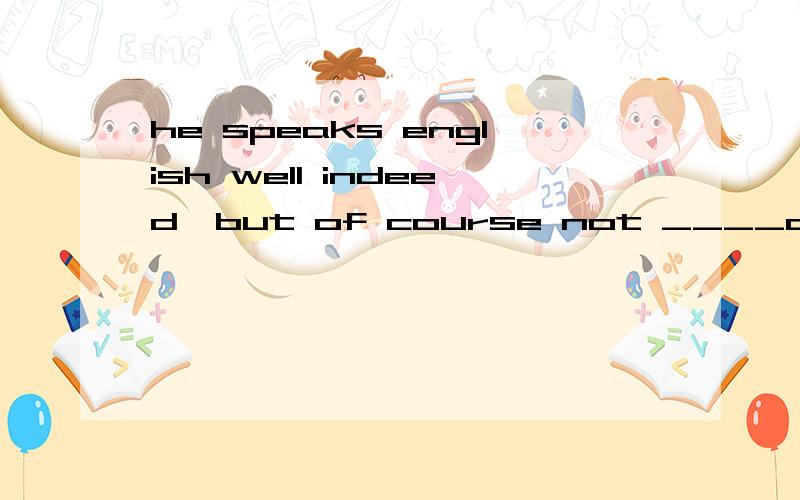he speaks english well indeed,but of course not ____a native speaker.A as fluent as B more fluent than C so fluently as D much fluently than 可是我不知道为什么选这个 那别的答案为什么不对呢 这句怎么翻译呢
来源:学生作业帮助网 编辑:作业帮 时间:2024/11/27 23:32:27

he speaks english well indeed,but of course not ____a native speaker.A as fluent as B more fluent than C so fluently as D much fluently than 可是我不知道为什么选这个 那别的答案为什么不对呢 这句怎么翻译呢
he speaks english well indeed,but of course not ____a native speaker.
A as fluent as B more fluent than C so fluently as D much fluently than 可是我不知道为什么选这个 那别的答案为什么不对呢 这句怎么翻译呢
he speaks english well indeed,but of course not ____a native speaker.A as fluent as B more fluent than C so fluently as D much fluently than 可是我不知道为什么选这个 那别的答案为什么不对呢 这句怎么翻译呢
首先待选主词是修饰动词speak的,必须是副词,由此排除AB,D much 不能修饰形容词、副词的原级,排除;
A not so/as...as B A不如...B...
肯定句,跟...一样,as...as ,否定则是as...as跟so...as两者都可以
但是这里因为是修饰speak是动词,要用副词修饰,所以需要fluently,如果要比较级的话应该是more fluently than
所以答案只能是C
不选D是因为在than前面或much后面形容词或副词通常用比较级
这里需要副词,答案在C/D之间产生。
他英语确实说得很好,但,当然是不如以英语为母语的人说得好啦。
最有迷惑性质的是A了,但是首先我们猜测一下句子的含义(当然是依据前后句意):他英语说的确实非常好,但是没有一个土著人说的那么流利·
然后我们大致可以排除B D两个答案,根本不符合句子的意思
再在A C两个里面选择,如果选择A的话,特指的句子下,后面的那个a native speaker 就要改为 the native speaker 为特指
所以选择C...
全部展开
最有迷惑性质的是A了,但是首先我们猜测一下句子的含义(当然是依据前后句意):他英语说的确实非常好,但是没有一个土著人说的那么流利·
然后我们大致可以排除B D两个答案,根本不符合句子的意思
再在A C两个里面选择,如果选择A的话,特指的句子下,后面的那个a native speaker 就要改为 the native speaker 为特指
所以选择C
收起